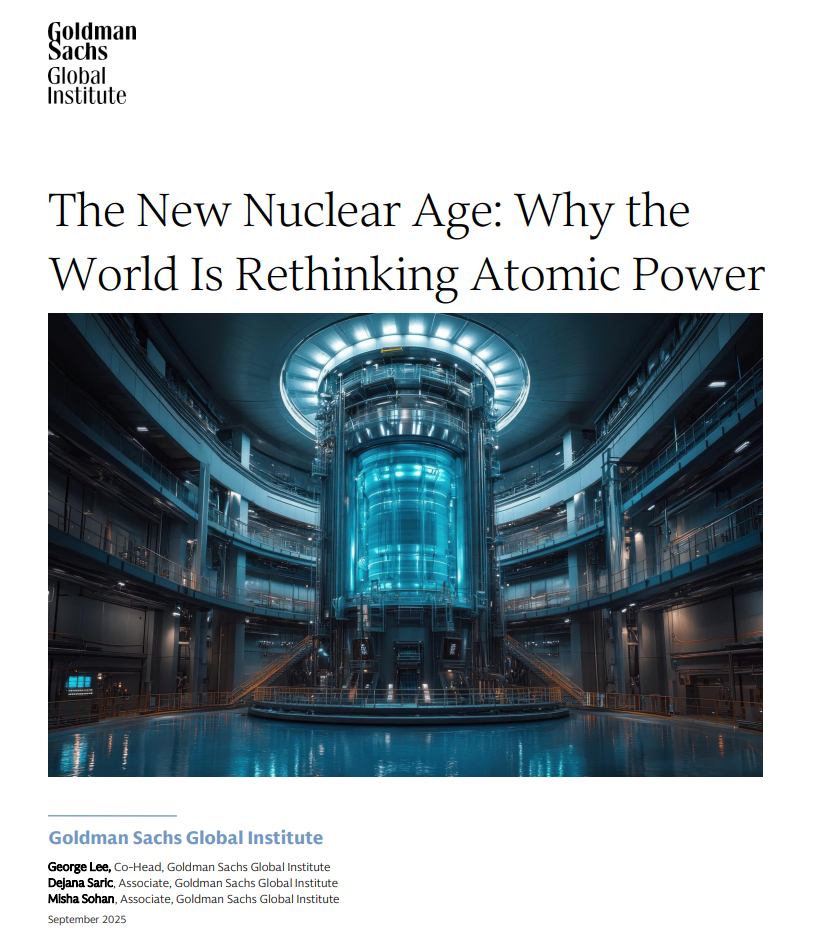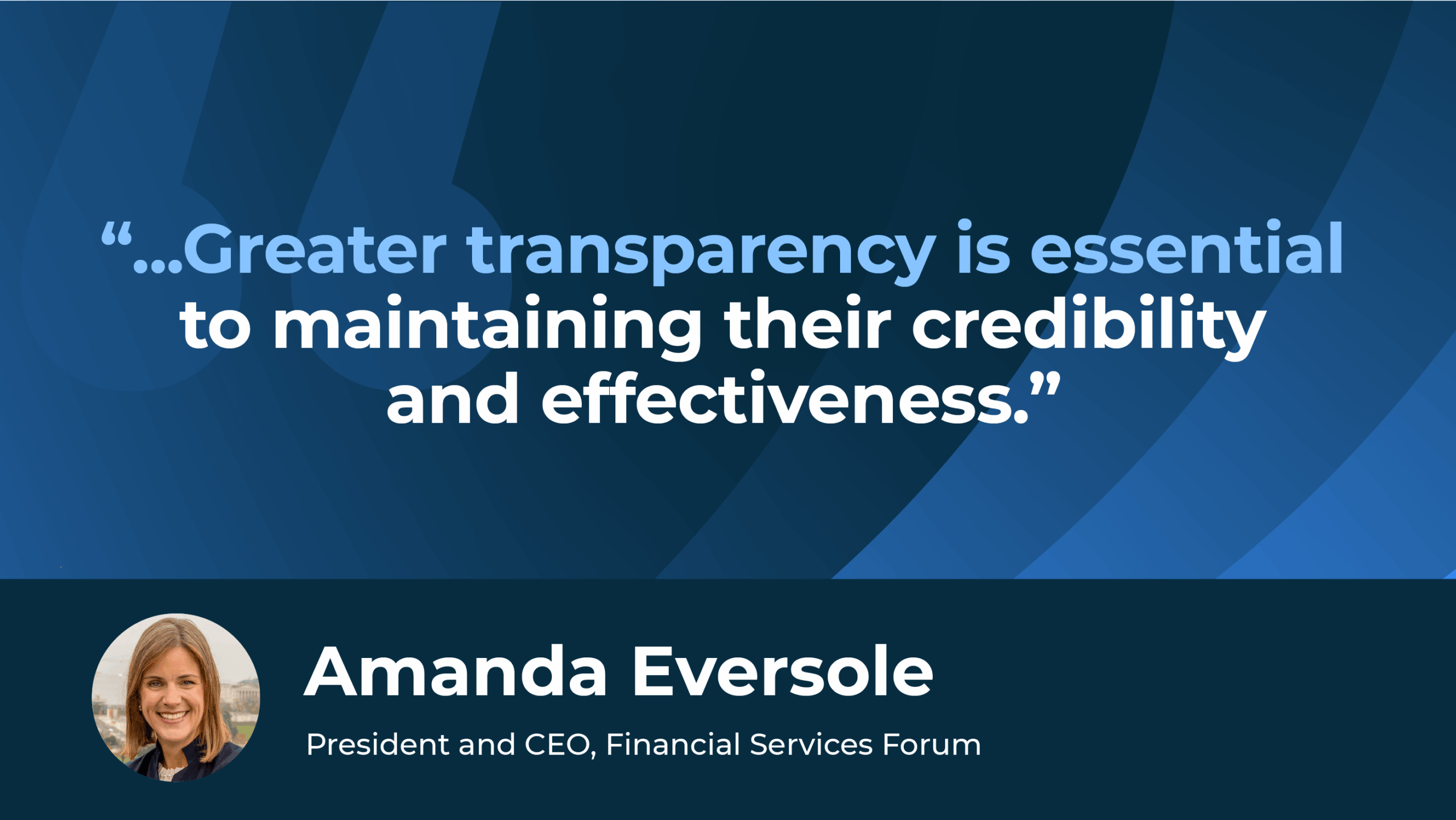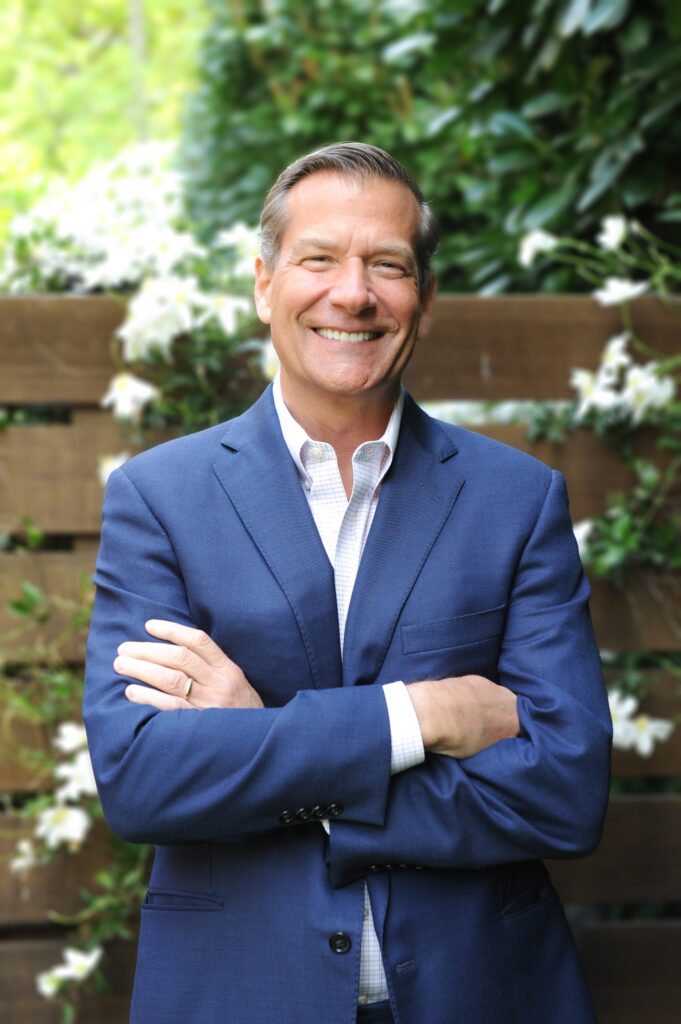Hello,
First, Forum members acknowledge the hardship caused by the ongoing shutdown and welcome efforts to reopen the government. America’s largest banks will continue to support customers and communities across the country and serve as a source of strength in times of uncertainty.
In this edition of The Forum File, we spotlight one firm’s perspective on the impact of AI investment and how it’s helping serve clients better, faster, and smarter. We’re also sharing how the Forum is engaging on key policy priorities that strengthen the financial system and support American families, businesses, and communities.
Thanks for reading!
Amanda Eversole, President and CEO, Financial Services Forum
Penny For Your Thoughts
George Lee, co-head of the Goldman Sachs Global Institute
How is the US positioned in AI transformation relative to the rest of the world?
The US has been the well-spring of innovation that is driving this revolution, and more than 80% of AI workloads occur in America. That said, this is a complex, intricate and expansive global supply chain where many regions play a critical role in the delivery of this capability. China, for example, is a consequential force in the ecosystem—with leading edge models, a growing silicon ecosystem and abundant energy resources.
Will the AI investment cycle be driven by the government or the private sector?
Most world leaders regard AI as being definitively consequential for their future growth, productivity, defense and culture. In the US, we are shifting policy to encourage and fund growth in the data center and energy complex. Across the world, this has become a priority for nation-states, and many will add capital to encourage growth and innovation. But make no mistake—fast-moving technology like AI must and will continue to be fueled by corporates and academic institutions.
What do you see as the biggest opportunities associated for banks and other industries as they implement AI?
There are three main opportunities. First, we can elevate the creativity and reach of our people to serve our clients better, faster and smarter. We can also streamline operational workflows to accelerate progress and reduce costs. Lastly, we have the opportunity to eliminate rote, repetitive human labor and take greater advantage of our junior employees’ talents and strengths.
Are we seeing any ROI on the investment so far? Where are enterprises in actual implementation of the technology?
At Goldman Sachs, we are seeing significant efficiencies from deploying AI in our Engineering function among our developer population and very promising early results from enabling all of our employees with access to leading edge models through our GS AI Assistant. Other use cases are also beginning to bear fruit, but we remain in the early days.
Value Add
Goldman Sachs on “The New Nuclear Age”

Before the rise of AI, global electricity demand was already expected to grow significantly. Now, AI is driving an even greater surge in consumption. As business and world leaders race to meet this need, Goldman Sachs is increasingly advising clients on opportunities in nuclear power.
After decades of underinvestment, generational technological breakthroughs, intensifying geopolitical competition, and the need for clean, dense, reliable power are positioning nuclear energy for a renaissance.
The commercial opportunities are far-reaching: as public and private sector investment flows into nuclear technology companies, investments will be needed in the broader nuclear supply chain. Globally, countries that master advanced nuclear technologies will gain not only energy security but also longstanding commercial relationships, soft power, and the ability to shape global norms. Capturing this opportunity will require increased investment, as well as new regulatory frameworks and government support.
Read the full Goldman Sachs Global Institute report.
Capital Gains
What we’re doing in Washington
The Forum welcomed the Federal Reserve’s proposals to improve the stress testing framework and emphasized the importance of greater transparency to support financial stability.

Next, on bank supervision: The Forum issued a statement welcoming proposals from the FDIC and OCC to prohibit reputation risk in supervision and clarify unsafe banking practices. “This is another positive step toward focusing bank oversight on real financial risks,” said Forum President and CEO Amanda Eversole.
In other news, the Forum, BPI, and the Association of Global Custodians submitted joint recommendations to the SEC to strengthen crypto custody rules to better protect customers and the financial system.
Our Two Cents
Research from the Forum
New research shows regulatory safeguards have significantly reduced any “implicit guarantees” for large banks. Forum Chief Economist Sean Campbell reviews the findings in our latest BankNotes Blog post.
In a separate analysis, Dr. Campbell explains that massively increasing deposit insurance comes at a cost to consumers and financial stability. He breaks down the past consequences of increasing coverage and what we should do instead to ensure a strong financial system.
Dr. Campbell also shared his perspective on federal financial oversight and what it means for the largest U.S. banks and the broader economy at the Cato Institute’s Right-Sizing Financial Regulation conference.
👉 Watch his remarks on the need to: support financial innovation and ensure capital and liquidity rules promote economic growth and stability.
Checking the Balance
Members in the News
Bank of America is committing $12 million to support homeowners and small businesses in Western North Carolina impacted by Hurricane Helene.
BNY announced a five-year, $10 million collaboration with Carnegie Mellon University to advance the research and development of artificial intelligence and prepare the next generation of leaders.
During the 2025 Ryder Cup, Citi – a Worldwide Partner for the prestigious international golf event – launched its “Tee Up for Good” campaign. For every hole won by Team USA or Team Europe, Citi donated $1,000 to No Kid Hungry.
Goldman Sachs 10,000 Small Businesses hosted the largest convening of small business owners in the US for a two-day summit that featured thought leadership from business leaders and gave thousands of entrepreneurs the opportunity to advocate for small business priorities in Washington, D.C.
JPMorganChase celebrated the Veteran Jobs Mission’s milestone of hiring over one million U.S. veterans since launching the initiative with partner companies.
Morgan Stanley announced its Inclusive & Sustainable Ventures 2025 global cohort, supporting 29 startups and four emerging nonprofits to further develop and scale through a five-month in-house accelerator program.
As the official investment management and ETF partner of the Women’s National Basketball Association, State Street Investment Management and its SPY ETF are helping fans learn about the importance of investing in their future.
The Wells Fargo Foundation announced a $3.2 million grant to four local initiatives to support affordable housing access, small business growth, and workforce development in North Minneapolis.
